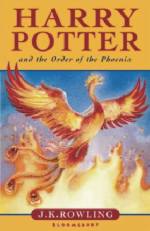| |
Under
her Spell
Can
JK Rowling maintain Harry Potter's appeal? NICHOLAS
LEZARD takes a look at her long-awaited new volume,
Harry Potter and the Order of the Phoenix
Harry
Potter and the Order of the Phoenix
by JK Rowling
766pp, Bloomsbury, £16.99

Is
this a childish phenomenon or an adult one? One may be arrested,
as I was, by the image, during a break in the TV coverage
of a cricket match, of an MCC member about a third of the
way through The Order of the Phoenix (this some 12 hours
after the book's publication); but the truly extraordinary
thing about it is that it is not all that extraordinary.
One became used, long ago, to the spectacle of adults reading
JK Rowling's work in all kinds of public places, unembarrassed
about being seen immersing themselves in a world of spells.
It is a phenomenon that one struggles to imagine the more
austere cultural critics commentating on without perplexity.
What would Walter Benjamin have had to say about it? Or
Karl Kraus? That its popularity was a symptom of a mass
regression to infancy, perhaps? It may constitute a desire
for a temporary flight from adulthood, but that isn't exactly
the same thing. And besides, what highbrow critic ever dismissed
Wagner because of his use of magical elements?
Still, much of the criticism levelled against Rowling does
seem to fall under the heading "category error".
To complain about her, shall we say, conservative imagination,
her somewhat stilted dialogue, or, as one critic cruelly
put it, her "mumsy and artless prose", is in a
sense to miss the point. The target audience, semi-officially,
is in the nine-to-12 age range, and on those terms, the
books are infallible. They deliver. Harry Potter and the
Order of the Phoenix also delivers more of the same, a shade
more grown up, with extra explanation of the back story.
I can't imagine anyone who is already happy with Rowling's
world being disappointed with its latest manifestation.
As for "mumsy and artless" - that was my line,
in this paper, when I compared Rowling unfavourably with
Ursula Le Guin, who also wrote a series of books beginning
with a young would-be adept being sent to wizard school
in order for him to enhance and discipline his power, and
learn to confront his destiny. But reading this book has
made me now realise that the comparison is specious - the
two authors are barely involved in the same process at all.
All children's authors have to take their worlds immensely
seriously, and that is about all that Rowling and Le Guin
have in common, once you have noted the superficial similarities.
Le Guin writes seriously; Rowling writes just the way an
11-year-old would ideally like to write.
If one pole of Rowling's imagination is the comic mayhem
of the Weasleys, the other is Dumbledore. She has to be
very careful with what he does and says. On his authority
rests the authority of her entire structure, just as is
the case with Aslan in the Narnia books, or Gandalf in Tolkien's
world. It is important for such characters to be like ideal
fathers: they are by no means without a sense of fun, but
their word is ultimately law - even when the world turns
against them. Dumbledore spends a good deal of time in The
Order of the Phoenix as a fugitive - he is sacked as headmaster
- and this expulsion from Eden is an almost inevitable development
for Rowling, as it is for Potter and the reader.
One question that had bothered me as much as anything else
was whether these Muggle relatives were ever going to be
granted a shred of humanity. In this book one of them is,
if fleetingly; and so, interestingly, is Snape, whose cinematic
incarnation in the supremely charismatic form of Alan Rickman
tells against his charmlessness in the novels.
So Rowling is pacing herself very well, then, and on her
own terms. She may be taking a swipe at the media with her
depiction of the muck-racking Daily Prophet, but she still
has time for the alternative press - Hermione's cunning
manipulation of Harry's fame saves the day at one point.
The pressures Rowling is under, both to deliver and not
to crack up, are almost inconceivable. This may give her
a sympathetic push when describing Harry's trials. (The
critic Robert Winder suggested to me that one of Harry's
punishments in Phoenix is strikingly reminiscent of Kafka's
"In the Penal Colony". I won't spoil either story
for you by saying which.) But however she's managed it,
she's still on form. You have to hand it to her.
Source: The Guardian |

